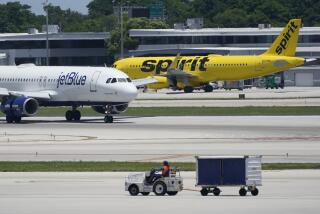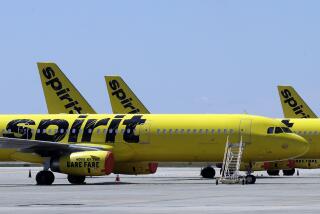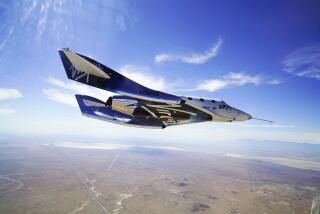U.S. prevents Virgin America from flying
Virgin America Inc., an airline partly owned by British billionaire Richard Branson that hoped to offer low-cost service out of the Bay Area, failed Wednesday to get U.S. government permission to begin flights within the United States.
Virgin America must revise its ownership and corporate structure so that it is at least 75% owned and controlled by U.S. citizens before it can start service, the Transportation Department said.
“Virgin America’s close relationship with the U.K.-based Virgin Group indicates that the carrier is not under the actual control of U.S. citizens,” the department said in a tentative ruling.
Virgin America, which has 14 days to respond to the order, said it would appeal.
“While we disagree with this tentative order, we respect the department’s decision and intend to use the order as a road map to address the issues raised and to demonstrate to the [department] that Virgin America will meet all ownership and control requirements,” airline spokesman Gareth Edmondson-Jones said in a statement.
The action is a blow to Branson’s effort to expand his Virgin brand into the world’s largest aviation market and create a company that could funnel passengers to his Virgin Atlantic Airways Ltd.
The decision is a victory for U.S. rivals that oppose the Virgin America bid as well as for organized labor, which fears job losses.
Virgin America, which is based in Burlingame, Calif., had anticipated the government’s rejection. Federal law limits non-U.S. ownership of airlines to 25% controlling stock and requires that citizens remain in actual control of all decisions.
Virgin America, however, has maintained that the start-up is majority-owned by U.S. citizens and that Branson has no involvement in management decisions.
Branson’s closely held Virgin Group Ltd. put up 25% of the initial $177-million investment to start Virgin America, as well as a $53-million loan. Virgin America executives say investment firms Black Canyon Capital of Los Angeles and Cyrus Capital Partners of New York control 75% of the carrier.
However, the airline’s “various interlocking financial agreements” with London-based Virgin Group show that the company is under foreign control, the Transportation Department said.
The carrier has 169 employees, nine aircraft and had planned to start service with a flight between San Francisco and New York. Donald J. Carty, former chief executive of American Airlines parent AMR Corp., is Virgin America’s chairman.
The company had waited more than a year for U.S. regulators to decide the matter. This month, the Federal Aviation Administration had approved the carrier as safe to fly.
Some have speculated that the Transportation Department’s action could hurt U.S. efforts to open aviation markets worldwide to additional competition. Analysts have said Branson could use the denial to argue that the European Union shouldn’t expand U.S. carriers’ access to London’s Heathrow airport.
More to Read
Inside the business of entertainment
The Wide Shot brings you news, analysis and insights on everything from streaming wars to production — and what it all means for the future.
You may occasionally receive promotional content from the Los Angeles Times.










